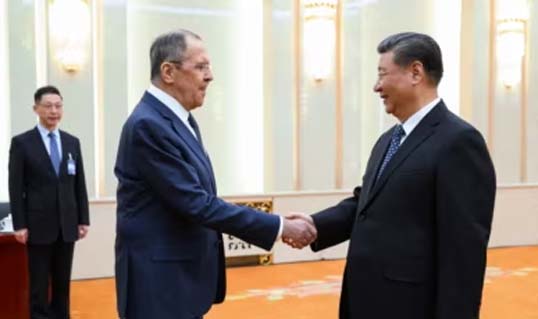Beijing has amplified the exportation of machinery, microelectronics, and other advanced technology to Moscow, which the latter has repurposed to fabricate missiles, armored vehicles, and other weaponry for deployment in its conflict against Ukraine, according to a U.S. intelligence evaluation.
Two senior officials from the Biden administration, who spoke under conditions of anonymity on Friday, highlighted that approximately 90% of Russia’s microelectronics in 2023 originated from China, enabling the creation of its military arsenal including missiles and aircraft. Approximately 70% of Russia’s near $900 million investment in machine tool imports in the last quarter of 2023 came from China.
Entities from both China and Russia are also collaborating on the production of unmanned aerial systems within Russia, while Chinese firms are likely supplying Russia with nitrocellulose for ammunition production, according to the officials. Companies based in China such as Wuhan Global Sensor Technology Co., Wuhan Tongsheng Technology Co. Ltd., and Hikvision are delivering optical components for Russian tanks and armored vehicles.
These officials asserted that Russia has obtained military optics from Chinese companies like iRay Technology and North China Research Institute of Electro-Optics, while China has also been supplying UAV engines and turbojet engines for cruise missiles.
Russian customs data analyzed by the Free Russia Foundation showed Russia’s semiconductor imports from China surged from $200 million in 2021 to more than $500 million in 2022.
Beijing is also assisting Moscow in augmenting its satellite and other space-based capabilities for deployment in Ukraine, an evolution that officials argue could potentially amplify the threat Russia poses across the European continent. The officials also disclosed that the U.S. has determined, based on downgraded intelligence findings, that China is supplying Russia with satellite imagery for its war against Ukraine.
These disclosures coincided with Secretary of State Antony Blinken’s expected travel to China this month for diplomatic dialogues. Prior to this, Blinken is slated to attend the Group of 7 foreign ministers meeting in Capri, Italy, where he is anticipated to raise concerns about China’s indirect support of Russia as Moscow modernizes its military and endeavors to consolidate its recent advances in Ukraine.
President Joe Biden has previously expressed his concerns directly to Chinese President Xi Jinping regarding Beijing’s indirect support for Russia’s military campaign.
Though China has not offered direct lethal military support to Russia, it has provided diplomatic backing by attributing the instigation of the war to the West, thus avoiding labeling it an invasion in deference to the Kremlin.
China has persistently affirmed its position of not supplying arms or military aid to Russia, while maintaining a vigorous economic partnership with Moscow, as well as India and other nations, despite sanctions imposed by Washington and its allies.
“The regular trade between China and Russia should not be hindered or restricted,” stated Liu Pengyu, spokesperson for the Chinese Embassy in Washington. “We urge the U.S. to cease belittling and casting aspersions on the normal relationship between China and Russia.”
Xi recently met with Russian Foreign Minister Sergey Lavrov in Beijing, who lauded Xi’s leadership.
Russia’s increasing economic and diplomatic isolation has deepened its reliance on China, a former adversary for leadership within the Communist bloc during the Cold War era.
Treasury Secretary Janet Yellen, returning to Washington from a visit to Beijing, warned Chinese authorities that the Biden administration was prepared to levy sanctions against Chinese banks, companies, and Beijing’s leadership if they assist Russia’s military efforts in its ongoing conflict in Ukraine.
The Democratic president issued an executive order in December bestowing Yellen the authority to sanction financial institutions that support Russia’s military-industrial complex.
“We remain wary about the part any entities, including those in the PRC, are playing in Russia’s military acquisitions,” Yellen stated to the press, using the initials for the People’s Republic of China. “I emphasized that businesses, even those in the PRC, must not provide material assistance to Russia’s war efforts and would face severe repercussions if they do. I reiterated that banks facilitating major transactions channeling military or dual-use goods to Russia’s defense sector expose themselves to U.S. sanctions.”
The U.S. has periodically revealed downgraded intelligence findings regarding Russia’s intentions and operations over the duration of the over 2-year-old war with Ukraine.
These efforts have primarily aimed at exposing plans for Russian disinformation campaigns or highlighting Moscow’s challenges in waging its war against Ukraine, as well as its coordination with Iran and North Korea to supply it with crucial weaponry. Last year, Blinken highlighted intelligence suggesting China was contemplating providing arms and ammunition to Russia.
The White House believes that the public disclosure of these intelligence findings has, at least for the time being, dissuaded China from directly arming Russia. China’s economy has also been slow to recover from the COVID-19 pandemic, and Chinese officials may be wary of the response from European capitals, which have maintained closer ties to Beijing, while U.S.-China relations have grown increasingly complex.
In a different context, China on Thursday imposed uncommon sanctions on two U.S. defense contractors for their support of arms sales to Taiwan, the self-governing island democracy Beijing claims as its own territory.
The sanctions freeze the assets of General Atomics Aeronautical Systems and General Dynamics Land Systems within China. Additionally, the companies’ management is prohibited from entering the country.
Filings reveal General Dynamics operates several Gulfstream and jet aviation services establishments in China, which remains heavily reliant on foreign aerospace technology even as it strives to cultivate its own capabilities in the field.
The firm is also instrumental in the production of the Abrams tank, which Taiwan is acquiring to replace outdated armor to deter or resist a potential Chinese invasion.
General Atomics is the manufacturer of the Predator and Reaper drones used by the U.S. military.









